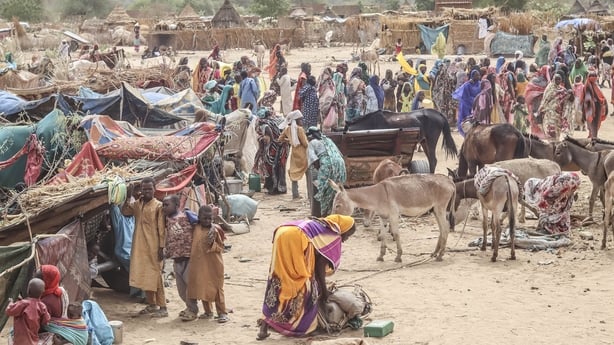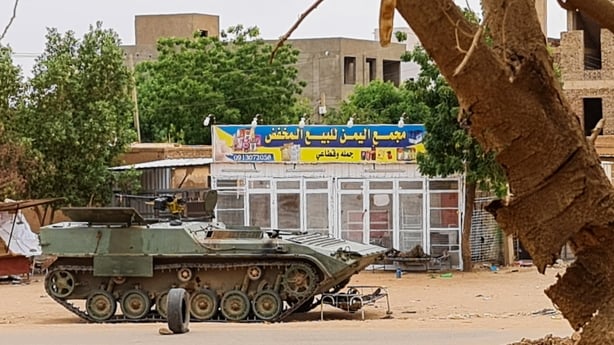Sudan's warring military factions have agreed in principle to a seven-day ceasefire to begin from Thursday.
South Sudan made the announcement as more air strikes and shooting in the Khartoum region disrupted the latest short-term truce.
A statement released by the foreign ministry of South Sudan, which had offered to mediate in the conflict, said its President Salva Kiir stressed the importance of a longer truce and of naming envoys to peace talks, to which both sides had agreed.
The credibility of the reported 4-11 May ceasefire deal between Sudanese army chief General Abdel Fattah al-Burhan and paramilitary Rapid Support forces (RSF) leader General Mohamed Hamdan Dagalo was unclear, given the rampant violations that undermined previous agreements running from 24 to 72 hours.
Sudan's war has forced 100,000 people to flee over its borders and fighting now its third week is creating a humanitarian crisis, UN officials said earlier .
The conflict risks developing into a broader disaster as Sudan's impoverished neighbours deal with a refugee crunch and fighting hampers aid deliveries in a nation where two-thirds of the people already rely on some outside assistance.
Egyptian President Abdel-Fattah al-Sisi said Cairo would provide support for dialogue in Sudan between the rival factions, but was also "being careful about not interfering in their domestic matters".
"The entire region could be affected," he said in an interview with a Japanese newspaper on Tuesday as an envoy from Sudan's army chief, who leads one of the warring sides, met Egyptian officials in Cairo.
United Nations officials had said UN aid chief Martin Griffiths aimed to visit Sudan today.
The UN World Food Programme said yesterday that it was resuming work in the safer parts of the country after a pause earlier in the conflict, in which some WFP staff were killed.
"The risk is that this is not just going to be a Sudan crisis, it's going to be a regional crisis," said Michael Dunford, the WFP's East Africa director.
We need your consent to load this rte-player contentWe use rte-player to manage extra content that can set cookies on your device and collect data about your activity. Please review their details and accept them to load the content.Manage Preferences
The commanders of the army and RSF, who had shared power as part of an internationally backed transition towards free elections and civilian government, have shown no sign of backing down, yet neither seems able to secure a quick victory.
That has raised the spectre of a prolonged conflict that could draw in outside powers.

A total of 246 Irish citizens and their dependents have now been evacuated from Sudan.
In a social media post, Tánaiste and Minister for Foreign Affairs Micheál Martin urged an end to the violence in Sudan so humanitarian aid can reach those who need it most.
'Millions' of children in need - UNICEF
The United Nations children's charity, UNICEF, says millions of vulnerable girls and boys need immediate humanitarian assistance.
Sudan's Chief of Communications and Advocacy with UNICEF Owen Watkins has said children are caught in the crossfire of this conflict.
"They are literally in the middle of the fighting and so they are having physical and psychological impacts of this.
"Even before this conflict started, the humanitarian situation in Sudan was horrific for children.
"We have approximately three million children malnourished in Sudan. At the moment, just as the conflict started, we had about 50,000 children in treatment for severe acute malnutrition.
We need your consent to load this rte-player contentWe use rte-player to manage extra content that can set cookies on your device and collect data about your activity. Please review their details and accept them to load the content.Manage Preferences
Daily terror in Sudan: 'We are really running out of everything'
At a glance: What is happening in Sudan?
"So if you imagine the capacity of the Aviva Stadium in Dublin, we had that capacity in treatment for severe acute malnutrition, which is the most dangerous type of malnutrition now, the treatment for those children is interrupted because of the conflict."
Speaking on RTÉ’s Morning Ireland, he said that aid is getting in to Sudan and UNICEF had pre-positioned aid.
"In any event we have a significant operation humanitarian operation in Sudan any way because of the humanitarian situation and so where possible we are using those pre-position supplies to get to children."

Mr Watkins said that the challenge is the security and safety situation, "so where we are able, we distribute supplies, we truck water, we provide healthcare kits to hospitals" where the security situation allows but where it is not safe UNICEF is not able to do that.
"Then obviously we have to pause."
Mr Watkins explained UNICEF’s current presence in Sudan saying there is about 250 national staff, plus a some international staff there.
He said UNICEF has moved operations to the northwest to Port Sudan but they also have a number of offices across the country.
"We have a dozen offices, not all of them are functioning, but again, we're safe to do so and where we can reach children, we are doing so on the ground."
He said that UNICEF will "absolutely" be back in Sudan once it is safe to do so.
"We will be going back in, in greater numbers once we're sure it's safe to do so on the ground," he added.
Sudan a changed country, says World Food Programme
Mary-Ellen McGroarty of the World Food Programme (WFP), who is based in South Sudan, said that over 27,000 people have crossed the border, with many coming to a country that has changed since they were last there.
She told RTÉ's Drivetime that, in the beginning, those arriving could move and make their own way but there are now more vulnerable people crossing and health screening is being offered as soon as they arrive.
Ms McGroarty said people were not coming with very much, as they have left everything in their lives and livelihoods behind, but the longer the conflict goes on, the more difficult it is getting and the suffering gets deeper.
The fighting must stop so people can rebuild, she added.
From the perspective of the WFP, Ms McGroarty said she was worried about the humanitarian impact but also the economic impact.
"Sudan is a key supply route for South Sudan, the WFP operations ... the rainy season has started and areas are difficult to access, prices are increasing and there are less deliveries and trucks are getting stuck so it's having a broader impact on food security."
"This could not have come at a worse time in terms of the broader impact it’ll have," she said.
South Sudan gets 20% of food supply from Sudan, but it is now looking at a longer time to import food from other countries which could be more expensive, Ms McGroarty added.

